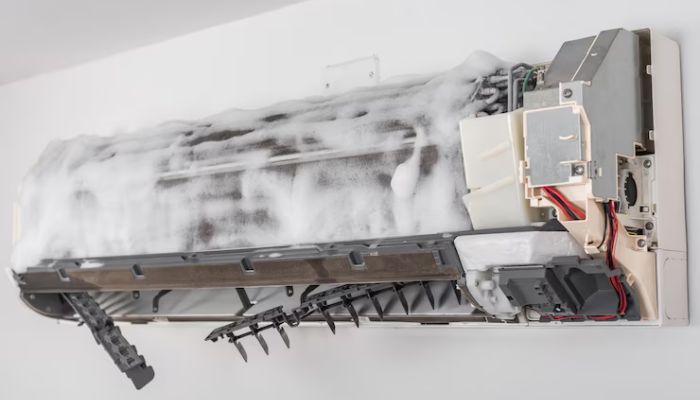Purchasing a brand-new air conditioner is an exciting investment, especially when the summer heat becomes relentless. However, nothing is more frustrating than discovering that your brand-new unit is freezing up. If you’re in this predicament, don’t worry—you’re not alone. While it might seem unusual for a new system to encounter issues, various factors can lead to this problem. In this blog, we’ll delve into the reasons why a new air conditioner might freeze up, how to address the issue, and how proper maintenance can prevent it.
What Does It Mean When an Air Conditioner Freezes Up?
When we say an air conditioner is “freezing up,” we’re referring to the buildup of ice on the evaporator coil or other components of the system. This ice formation restricts airflow and impairs the unit’s ability to cool effectively. If left unchecked, it can cause significant damage to the unit’s components, leading to costly repairs or even replacement.
Common Causes of a Brand New Air Conditioner Freezing Up
Although new air conditioners are built to perform efficiently, several factors can contribute to freezing issues. Let’s explore the most common reasons:
1. Improper AC Installation
One of the leading causes of freezing in a new air conditioner is improper installation. If the system isn’t installed correctly, it can lead to refrigerant leaks, poor airflow, or incorrect refrigerant levels—all of which can result in a frozen unit. If you’ve recently had an AC installation in Maryland, it’s essential to ensure the work was done by a qualified and experienced technician.
2. Restricted Airflow
For an air conditioner to function efficiently, it needs consistent airflow across its evaporator coil. Restricted airflow can occur due to several factors, such as:
- Dirty or clogged air filters: Even in a new system, filters can accumulate dust and debris if not replaced or cleaned regularly.
- Blocked vents or ducts: Furniture or other objects obstructing vents can impede airflow.
- Undersized or poorly designed ductwork: If the duct system doesn’t allow adequate airflow, it can cause the evaporator coil to freeze.
3. Low Refrigerant Levels
Although low refrigerant levels are often associated with older systems, they can also affect new units. If your brand-new AC was installed with incorrect refrigerant levels or if there’s a leak in the refrigerant lines, the evaporator coil can become too cold, leading to ice buildup.
4. Thermostat Settings
Setting the thermostat too low for extended periods can force the system to work harder than necessary, potentially causing freezing. While it’s tempting to crank the AC to its lowest setting during a heatwave, it’s better to aim for a moderate, consistent temperature.
5. Outdoor Temperature
Air conditioners are designed to operate within specific temperature ranges. Running your AC when outdoor temperatures are too low can cause the refrigerant to cool excessively, leading to ice formation. This issue is more common during transitional seasons like spring or fall when temperatures can fluctuate significantly.
6. Faulty Components
Despite being new, some air conditioners might have faulty components due to manufacturing defects. Common culprits include:
- Malfunctioning blower fans: These fans are responsible for circulating air across the evaporator coil. If they’re not functioning properly, airflow may be insufficient.
- Defective thermostats or sensors: Incorrect readings can cause the system to overcool, leading to freezing.
- Improper refrigerant metering devices: If these devices malfunction, they can result in uneven refrigerant flow.
How to Address a Freezing Air Conditioner?
If you notice ice forming on your air conditioner, it’s crucial to act quickly to prevent further damage. Here’s what you can do:
1. Turn Off the AC
The first step is to turn off the air conditioner to allow the ice to melt. Running the unit while it’s frozen can strain the compressor and other components.
2. Check Air Filters and Vents
Inspect the air filters for dust and debris. If they’re dirty, clean or replace them. Additionally, ensure all vents and registers are unblocked.
3. Inspect the Outdoor Unit
Clear away any debris, such as leaves or dirt, from the outdoor condenser unit to ensure proper airflow.
4. Contact an AC Installation Service
If the problem persists, it’s best to call a professional AC installation service. A qualified technician can inspect the system, identify the root cause, and recommend appropriate solutions.
Preventing Your Air Conditioner From Freezing Up
Prevention is always better than cure. Here are some tips to keep your air conditioner in top shape:
1. Schedule Regular Maintenance
Even new air conditioners benefit from routine maintenance. A professional tune-up can identify potential issues before they escalate, ensuring your unit operates efficiently.
2. Replace Air Filters Regularly
Make it a habit to check and replace air filters every one to three months, depending on usage and environmental factors.
3. Monitor Thermostat Settings
Set your thermostat to a reasonable temperature to avoid overworking the system. A programmable thermostat can help maintain consistent settings.
4. Ensure Proper Installation
Choose a reputable company for your AC installation service. Proper installation is crucial for your system’s longevity and efficiency.
5. Keep Ductwork Clean
Clean and seal your ductwork to ensure optimal airflow and energy efficiency.
6. Inspect Refrigerant Levels
Have a technician check the refrigerant levels during routine maintenance to ensure they’re within the manufacturer’s specifications.
Finding a trusted AC installation service is essential for resolving freezing issues and maintaining your system’s performance. Professionals can diagnose and fix the problem, ensuring your unit operates smoothly for years to come.
Conclusion
A brand-new air conditioner freezing up can be a puzzling and frustrating experience, but it’s often caused by common issues such as improper installation, restricted airflow, or thermostat settings. By understanding the potential causes and taking preventive measures, you can ensure your AC operates efficiently and reliably. Regular maintenance and choosing a reputable AC installation service are key to avoiding such problems. With the right care, your new air conditioner can keep you cool and comfortable for many summers to come.


 855-410-TECH(8324)
855-410-TECH(8324) APPLY FOR FINANCING
APPLY FOR FINANCING